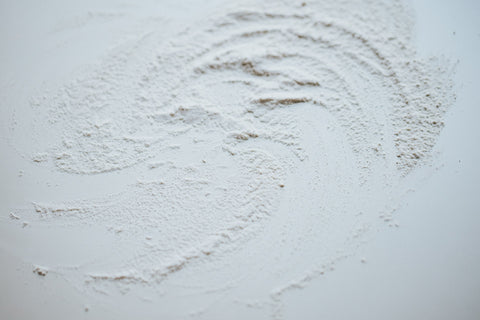
Potassium sorbate
What Is Potassium Sorbate?

Potassium Sorbate is an odorless and tasteless white crystalline powder, pellet, or granule that is the potassium salt of sorbic acid.[1] Sorbic acid occurs naturally in the berries of the mountain ash (Sorbus aucupario L. Rosaceae), making it a natural and organic compound.[2] This chemical additive is commonly used to stop the growth of mold, fungi, and yeast, as well as a preservative to prolong the shelf life of food.
What Does Potassium Sorbate Do in Our products?

Potassium Sorbate is a preservative; it keeps microorganisms from growing. It is a common ingredient in cheese, baked goods, juice, produce, wine, soda, pickled products and some protein products.[3] Potassium Sorbate in also present in thousands of personal care products, including shampoo, conditioner, body wash, moisturizers, makeup, sunscreen and other items.[4] It dissolves in alcohol and slightly in water.
Potassium Sorbate
How Potassium Sorbate Is Made

The main component of potassium Sorbate, sorbic acid, occurs naturally as para-sorbic acid in berries of the mountain ash tree. However, it is often synthesized by various processes.[6] This can include, for example, condensing crotonaldehyde and acetic or malonic acid in pyridine solution, condensing crotonaldehyde and ketene in the presence of boron trifluoride, and other processes.
Potassium Sorbate is manufactured by reacting sorbic acid with an equimolar portion of potassium hydroxide. The manufacturer then crystallizes the resulting potassium Sorbate from aqueous ethanol.
Is Potassium Sorbate Safe?

If you’ve ever wondered, “Is potassium sorbate bad for you?” learn more about the safety of this ingredient when it comes to your health and the environment.
Common Concerns
- Cancer: Low risk
- Allergies and Immunotoxicity: Moderate risk
- Development and Reproductive Toxicity: Low risk
- Use Restrictions: Low
Health Safety
There has been some research showing that in some rare cases when used in cosmetics or skincare products, potassium sorbate may cause skin allergies for some people. However, Potassium Sorbate is safe for everyday use in small amounts and is safe to eat according to the FDA. For topical application, a concentration of no more than 0.2% is unlikely to constitute a safety hazard.
Environmental Safety
As an organic compound derived from mountain ash berries, the ingredient is readily biodegradable. This natural compound is also not suspected to be bioaccumulative.
-
nitrile-rubber-honoring-strict-production-standardsNewsAug.22,2025
-
aspartame-ingredients-honoring-food-safety-valuesNewsAug.22,2025
-
fertilizer-for-balanced-plant-nutritionNewsAug.22,2025
-
cyanide-gold-processing-with-high-purity-additivesNewsAug.22,2025
-
formic-acid-in-textile-dyeing-applicationsNewsAug.22,2025
-
aluminum-hydroxide-gel-in-skincare-productsNewsAug.22,2025
-
Regulatory Compliance for Global Mining Chemicals UseNewsAug.12,2025
Hebei Tenger Chemical Technology Co., Ltd. focuses on the chemical industry and is committed to the export service of chemical raw materials.
-

view more DiethanolisopropanolamineIn the ever-growing field of chemical solutions, diethanolisopropanolamine (DEIPA) stands out as a versatile and important compound. Due to its unique chemical structure and properties, DEIPA is of interest to various industries including construction, personal care, and agriculture. -

view more TriisopropanolamineTriisopropanolamine (TIPA) alkanol amine substance, is a kind of alcohol amine compound with amino and alcohol hydroxyl, and because of its molecules contains both amino and hydroxyl. -

view more Tetramethyl Thiuram DisulfideTetramethyl thiuram disulfide, also known as TMTD, is a white to light-yellow powder with a distinct sulfur-like odor. It is soluble in organic solvents such as benzene, acetone, and ethyl acetate, making it highly versatile for use in different formulations. TMTD is known for its excellent vulcanization acceleration properties, which makes it a key ingredient in the production of rubber products. Additionally, it acts as an effective fungicide and bactericide, making it valuable in agricultural applications. Its high purity and stability ensure consistent performance, making it a preferred choice for manufacturers across various industries.






